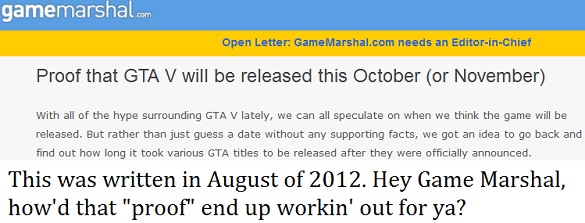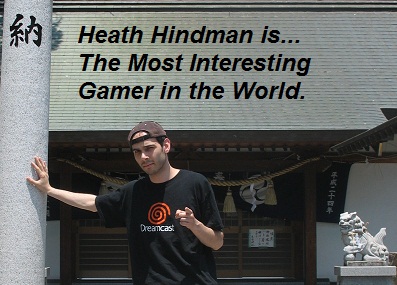He is literally screwing this website… or is that even possible?
Tech journalism, including gaming media, is a tricky thing. To write general world news, one doesn't usually need a great deal of insider knowledge. Just give the facts to the news man, and let him go. With tech writing, however, we find a problem. If you don't know much about the products you're describing, there's not much you can do or say that will not set off alarm bells and let everyone know that you have no idea what you're talking about. Enter the enthusiast press.
Blogs and news websites dedicated to technology products like iPads, video games, and computer parts tend to be written by people whose biggest qualifications are how much they love the product and/or how much they know about it. Being a decent writer sits in a distant second place, where it's considered a lovely perk, but hardly a job requirement. Due to this, we see a lot of words constantly misused by gaming press and their readers alike. I've made a list of the biggest and most frequent offenders.
Bias
Whenever a reviewer gives a game a very high or very low mark, some fool out there is going to call "bias." Too often, however, they use the term to mean "liking things that you like and disliking things that you dislike," which is a little bit on the obvious side, as every human does this.

"Bias" is actually the stating of an opinion that has been influenced by an outside factor. Suzie the reviewer liking Gran Turismo and giving it a glowing review isn't bias—that's Suzie being a human and enjoying something, seeing its qualities as something appealing, and thereby praising them. Now, where this can turn sour is if Suzie was ever a Sony employee. In such a scenario, she might have extra incentive, extra reason to give it high marks. If she is personal friends with the director or if she stands to make a nice paycheck from the sales, that is bias. We could use the word as a verb there: "These factors bias Suzie's review," or as a noun, "This review contains some bias."
Game writers might even use the term themselves and say things like, "Well, I have a bias towards Nippon Ichi stuff," which, in media context, is not the way to use that word. You might have a favoritism in your reviews, you might have preferences as a player, but if you say you have a bias, it means you either:
A) Are intentionally weeding out positive-sounding news about other games/companies, or…
B) Have some sort of connection with Nippon Ichi and are therefore driven by motivations other than giving your evaluation of a game.
Two words being synonyms does not mean they can be used at all of the same times and in the same ways.
Based On / Based Off
I see this one far too often. "Based on" means one thing is built upon the intellectual foundation of something else—something that came earlier. "Disney's Tangled is based on the story of Rapunzel." The mistakenly overused "based off" means someone has constructed a physical base somewhere geographically close to something else. For example, "The new oil rig is based off the coast of Alaska."
This is why you never see the phrase "based off a true story" used by anyone making a decent amount of money for their profession. On. Based on a true story.
Literally

This is a word reserved for times when a phrase can be said or understood multiple ways. If you say, "Fred ate my whole kitchen," it would usually mean that Fred ate a lot of food, but if you said, "Fred literally ate my whole kitchen," then you are telling me that Fred didn't stop with food, but he started ripping out your pipes, tearing up your floor, putting sauce on your appliances and shoving them all into his mouth for consumption.
"I literally died when I read that," said John Q Gamer. Well, no you didn't, John, because that would mean you were unable to type that message.
"Our jaws literally hit the floor." Well, no they didn't, TV Guide, because that tends to knock people out and require medical attention.
"This is literally the best game I've ever played." Well, you don't need the word "literally" there, because there is no figurative best game you've ever played. There's only one way to take that message, so you don't need to modify it by telling me that you are being literal. That's a sloppy abuse of a precious, valuable, unique word whose meaning dies a little bit every time you say things like that.

Evidence and Proof
These two get confused all the time. Evidence is something that shows and indication of a possible conclusion; it's something that supports a claim, not something makes that claim undeniable. Proof, meanwhile, is a collection of evidence that forms something so solid, it can not be argued; it's a fact. Yet, here is this article from mid 2012 saying that it has "Proof" that Grand Theft Auto V will be coming out in October of 2012. Well, kiddos, that wasn't proof. If you want to use the word "evidence," you can, because evidence is not 100% certain. In this case, that release date didn't happen (nor was it ever even announced) and the website was wrong, but the term "evidence" can still be applied.
Amazon's game release dates generate popular discussion these days, but are they proof or evidence? They're evidence, because they are very far from consistent.
In a court room, lawyers don't present proof, but evidence, and hope that it collectively proves something. They hope that it becomes proof. Even the proverbial smoking gun is evidence, not proof by itself. (I suppose it proves that a gun was fired, but nothing more, without further investigation.) That gun plus other pieces of evidence like plausibility, fingerprints, and a clear video tape of Ed Smith killing a guy form proof. A retailer release date for a game is evidence; a company making the announcement itself is proof.
I'm gonna create a hip, early-'90s-style slogan for this one: Don't be a proof goof.

Opinion and Fact
No, comment poster, there is no completely factual way to review a game. Who came up with this ridiculous idea and how is such stupidity gaining traction? Have fourth-grade school teachers not been doing their jobs lately? Facts are for previews, while a combination of facts and opinions are for reviews. Quick breakdown:
The game runs at 30 frames per second. = Statement of fact.
The game runs smoothly. = Statement of opinion.
The graphics are among the system's best. = Statement of opinion.
There are graphics in this game. = Statement of fact.
The graphics are good. = Statement of opinion.
It's one of the most interesting stories of the generation. = Statement of opinion.
Dual language tracks are available. = Statement of fact.
Voice work is well done. = Statement of opinion.
The battle system lacks depth. = Statement of opinion.
How much you like or dislike the battles will depend on how much you like or dislike the battles. = Statement of fact.
A completely factual review is nearly impossible, it can often be done without even playing a game, and were it to be done, it would be boring as hell. [In fact, I would call it a FAQ. ~Ed. Nick Tan] It goes beyond the discussion of reviews, and I too often see opinion discussions in which both sides are presenting their own feelings as cold, hard facts.
Your / You're
Okay, this last one is just a request from a lover of good English. Guys, everyone will make typos on occasion, but I'm seeing this one used incorrectly more often than I'm seeing it used correctly. It takes 0.013 extra seconds to make sure you're using the correct form of "your" or "you're." [Let me throw "it's" and "its" in here as well. ~Ed. Nick Tan] And "ur" is not a suitable replacement if you are over the age of 15.
In conclusion, never ever read or say anything on the internet. "You're biased opinion is literally wrong, based off what my research proves."
Think before you speak, my friends.











